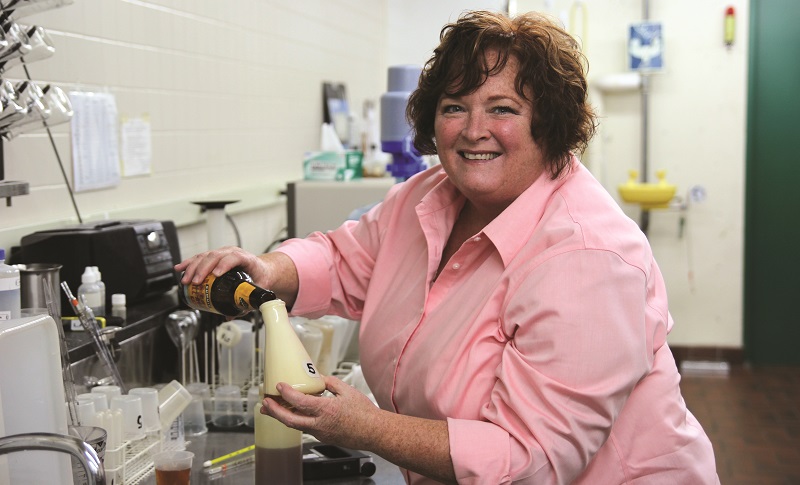of Summit Brewing Co.

Three decades into a distinguished brewing career, Rebecca Newman is a strong advocate for quality beer. After starting at Anheuser-Busch and following a stretch making sake, she set up the quality program at Sierra Nevada Brewing Co. She then moved east and helped create the Samuel Adams “perfect pint” glass and later worked on recipe and ingredient development at Dogfish Head Craft Brewery. She is now the quality manager at Summit Brewing Co., which is celebrating its 30th anniversary.
All About Beer: What has been the biggest change you’ve seen in the industry?
Rebecca Newman: It’s the acceptance by consumers of so many different styles and the willingness to try new beers. The consumer has become more beer-savvy and more interested in the beer they are drinking. The consumer is making a conscious decision regarding beer choice. For brewers, it’s the willingness to come to the game and make really good beers.
For all the good, you’ve spoken publicly and passionately about many of the quality pitfalls that exist. Chief among them are glass growlers.
I think they are scary and not safe. Sanitation is one thing. They work well for immediate fill, one use. The growler is clean and ready to be filled at the brewer’s location. The consumer sees it being filled, and use is immediate: that evening with friends, a picnic or the like. If it’s for a quick turn, fine. My grind is the folks that don’t have the technology to fill it well, the tap houses and other entities that will prepackage growlers and then sell it from a fridge like milk. Over time, it doesn’t store well and doesn’t taste good. It becomes “bad beer.” It is not the same beer the brewer intended.
We’re talking glass growlers here, so on the safety side?
Say it’s filled and on a shelf, and a consumer takes it home. Maybe it has unfermentables. It stays in a warm car and when it finally comes out, and if it drops—boom—it’s a bomb. Also that round handle, people think you can grab and go, even swing it, but maybe there is a stress fracture from multiple uses and presents the possibility to break and fall again. I just don’t like them. If you want packaged beer, go to a brewery that has the technology to package right.

You’ve said that bad beer from breweries keeps you up at night. Why?
When a brewer doesn’t build quality into process, the consumer pays for bad beer. Bad craft beer shines an ugly light on good craft beer because the rest of us are working day and night to make best beer possible. Quality needs to be in every piece of process. It says something when breweries spend so much on vessels and piping and aren’t spending as much, or even a fraction, to build quality. There are a lot of homebrewers and noneducated brewers who are starting up, aren’t classically trained and are putting a product out into market. They are using exotic ingredients that aren’t vetted, they don’t know how beers will age, taint lines, and the consumer pays for the brewer’s learning curve. There’s no guarantee, no work to support that the beer will be as good as the brewer intended it to be.
There are some brewers who might argue for art over science.
The better the beer, the better it is for the business. Quality first. I gotta believe that. I live that every day. I only work with brewers that embrace integrated quality. That begins with raw materials and continues to the final package. I think that if a brewer embraces quality—quality testing, quality process—the brewer can build a sustainable brand and a sustainable brewery. The folks who came late to the game, or as brewers without education and set up a commercial brewery without putting quality first, are wasting their money. The brewer that decides to go commercial without education or investment into quality is better off spending their investment elsewhere. You can take a quality person and make a brewer. You can’t take a brewer and make a quality person every time. Besides, I’m a scientist and I look for meaning, quantifiable and qualitative meaning for the breweries I work with.
For all that can be improved, what inspires you every day?
I love the opportunity to grow quality; it’s not static. I love the opportunity to collaborate, not only with where I work, but within the brewing community itself—other brewers, hop growers, grain growers and those providing ingredients. It’s all incredibly collaborative. And the harder I work to make the beer better, the better it is for business.
—This interview was conducted and edited by John Holl.
Go to the next page to learn more about Rebecca Newman.
Click here to read more conversations with brewers.
Pages:Next
John Holl
John is the editor of All About Beer Magazine and the author of three books, including The American Craft Beer Cookbook. Find him on Twitter @John_Holl.
